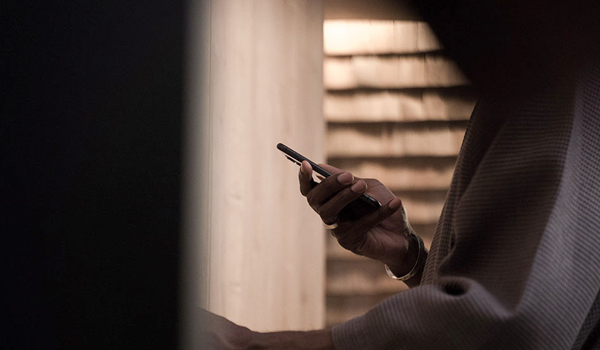Government crackdown on sharing intimate images without consent
People who share intimate images without consent face up to six months in prison under a government crackdown on so-called ‘revenge porn’.
This would rise to two years where it is proven a perpetrator also intended to cause distress, alarm or humiliation, or to obtain sexual gratification.
Offenders found guilty of sharing the image for sexual gratification could also be placed on the sex offenders’ register.
For the first time, the sharing of ‘deep fake’ intimate images – explicit images or videos which have been digitally manipulated to look like someone else – will also be criminalised under the new measures announced on Tuesday (June 27).
The Government said the amendments to the Online Safety Bill will protect victims of ‘revenge porn’ by changing current laws which require the prosecution to prove that perpetrators shared sexual images or films in order to cause distress.
“Removing the need for lawyers to prove the intention of distress will make it easier to charge and convict someone who shares intimate images without consent – putting more offenders behind bars and better protecting the public,” it added.
The reforms follow the campaigning of TV personality Georgia Harrison, who was the victim of image-based abuse at the hands of her former partner, and Dame Maria Miller MP, as well as recommendations from the Law Commission, to introduce reforms to the laws covering the abuse of images.
Lord Chancellor and Secretary of State for Justice, Alex Chalk KC, said: “We are cracking down on abusers who share or manipulate intimate photos in order to hound or humiliate women and girls.
“Our changes will give police and prosecutors the powers they need to bring these cowards to justice, safeguarding women and girls from such vile abuse.
Ms Harrison said: “The reforms to the law that has been passed today are going to go down in history as a turning point for generations to come and will bring peace of mind to so many victims who have reached out to me whilst also giving future victim’s the justice they deserve.
“I’m so grateful to everyone who supported me throughout this campaign and it just goes to show how amazing our country is that the Government have reacted so quickly to push through these amendments.”
Research shows one in seven women and one in nine men aged between 18 and 34 have experienced threats to share intimate images, with more than 28,000 reports of disclosing private sexual images without consent recorded by police between April 2015 and December 2021.
Deepfakes, which typically involve the use of editing software to make and share fake images of a person without their consent and which are often pornographic in nature have also been increasing in recent years.
A website that “virtually strips women naked” received 38 million hits in the first eight months of 2021, the Government said.
Minister for Technology and the Digital Economy, Paul Scully, said: “The unsolicited sharing and manipulation of intimate photos is a cowardly and revolting thing to do and has an absolutely devastating impact on the lives of women and girls across the UK.
“The Online Safety Bill will make the UK the safest place in the world to be online. These new laws set a global standard for bringing justice to those who share these images, protecting women and girls from this shocking abuse.”
By broadening the scope of current intimate image offences through the Online Safety Bill, the Government says more perpetrators will face prosecution and potentially time in jail.
Justice Minister Edward Argar said: “No one should ever fear that their intimate images will be put online without their consent and the true courage shown by Georgia Harrison to tell her story will help empower more victims to come forward and get the justice they deserve.
“Our reforms will make it easier to convict these vile individuals and protect women from being subject to such predatory abuse.”
Association of Police and Crime Commissioners joint victims’ leads, Caroline Henry and Sophie Linden, said: “The creation and distribution of private images of someone without their consent is wholly despicable and has been used by perpetrators to control and humiliate victims for far too long.
“These new amendments to the Online Safety Bill will provide the police with more of the tools they need to help bring perpetrators of these appalling acts to justice.
“This is a real step forward in raising public awareness that image-based abuse is unacceptable and will not go unpunished.”
Domestic Abuse Commissioner Nicole Jacobs, said: “Intimate image abuse causes significant distress to victims and survivors, and often exists as part of a wider pattern of abuse that continues offline.
“I am pleased to see these changes in the Online Safety Bill that will hold perpetrators to account for this insidious form of abuse and hope to see it pass soon.”
Ruth Davison, chief executive officer of Refuge, said the charity welcomed these amendments to the Online Safety Bill.
“Intimate image abuse is a multifaceted and complex form of domestic abuse, which can be perpetrated in many ways,” she said.
“In 2021, threatening to share intimate images was criminalised, following the success of Refuge’s ‘The Naked Threat’ campaign.
“At Refuge, we know that conviction rates for intimate image abuse remain woefully low. The amendments to the Online Safety Bill announced today will make it easier to prosecute perpetrators of intimate image abuse, ensuring justice and better protections for survivors.”
The overhaul of intimate image law builds on government action in recent years to better protect victims and bring more offenders to justice. This includes making ‘upskirting’ and ‘breastfeeding voyeurism’ specific criminal offences, extending ‘revenge porn’ laws to capture threats to share such images, and using the Online Safety Bill to create an offence specifically targeting ‘cyberflashing’.
The Government has committed to bringing forward wider reforms around intimate images, following the Law Commission’s detailed review, as soon as parliamentary time allows.


